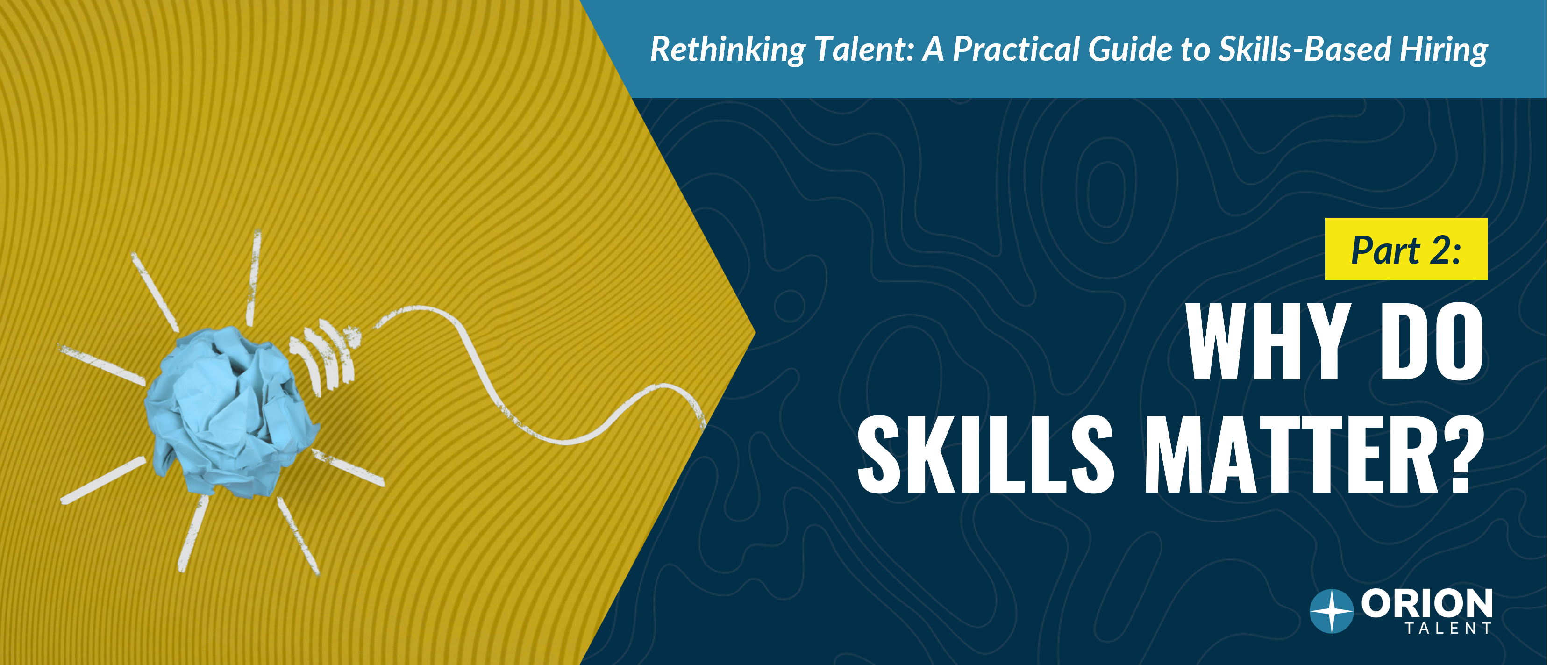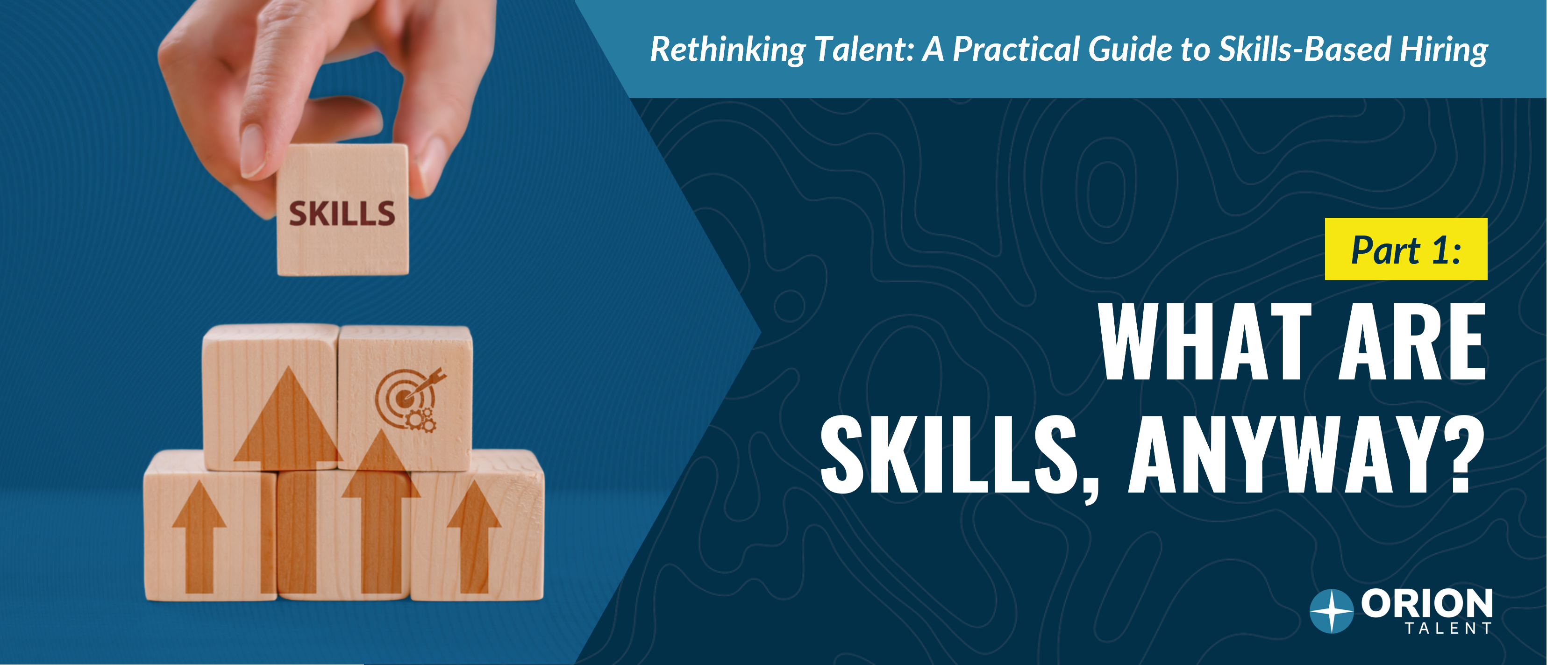When we talk about identifying talent, we’re usually talking about identifying that talent within the job market. Whether you’re a soldier on the front lines of the war for talent or are wandering from one dry talent pool to another, we’re all used to talking about talent as a resource – a resource that’s in short supply.
Talent, however, is not a resource and no matter how much “talent” you hire, talent is not a person. Talent is defined as “a natural aptitude or skill,” and identifying individuals with the talents you need, will become more and more important in today’s disruptive, “sink or swim” economy.
That being said, most companies seem to be operating under the assumption that talent can only be brought in from the outside, not developed internally. When a company operates under this assumption and chooses to hire for senior positions instead of filling these positions with promotions, it can have unfortunate results.
Hiring fresh blood can re-vitalize a team with anemic performance, but always choosing to hire might be the reason that your employees aren’t responding well to the talent you keep hiring. You shouldn’t promote under-qualified people, but you should also make sure that you aren’t stepping on any toes.
You won’t always be able to use a promotion to fill open jobs at your company, but, when you can, you should. Emphasizing internal promotions shows your employees that they can have a future at your company, which will improve retention and engagement. Even if an employee doesn’t plan on working for your company in a different role, emphasizing professional and skill development will help these employees along their career path.
Focus your culture on continuous improvement and recognizing the talent of your employees. If you can invest in developing the talents of your brightest employees, you can be prepared to pass off the torch from a veteran employee to a rising star at your company.
The talents required to excel in any job or any industry will be different, but we recommend developing a policy around talent identification and development that goes something like this:
1. Create guidelines for identifying talent at all levels of your company.
2. Always encourage employees to develop their skills and give them resources to do so.
3. Always recognize the talents of your employees and provide opportunities for advancement.
4. Never hire when you can promote.
5. Never promote if they aren’t up to the job.
Identifying and Developing Talent at your Company
1. Create Guidelines for Identifying Talent at all Levels of your Company.
What is your strategy for identifying talent at your company? Are you holding talent shows? Are you peering out into your office, waiting for a bright idea to flash across the faces of one of your employees? Are you passing out surveys asking your employees to rate themselves from “Highly Talented” to “Highly Incompetent?
All jokes aside, the way in which you identify talent at your company must be systematic and data-driven. Additionally, leadership at all levels of your company must commit to looking for and nurturing talent wherever it is found. Nobody likes getting shown up, so rewarding managers for finding and developing internal talent is a good way to ensure that everyone is looking for the next rising star at your company.
Once you have the buy-in from managers throughout your company, ask them to answer the following questions about different jobs at your company (especially other management roles):
1. Who have been the most successful at this job in the past?
2. Which talents/skills did they rely upon to achieve this success?
Depending on the job, there may be very little wiggle room for the skills used to get the job done, but you want to know which talents helped people to excel in every role at your company. Whether your top performers used their talents in communication, creativity, observation, etc. everyone should be focused on identifying and nurturing the talents that are proven to relate to success.
Having managers and employees answer these questions will give you a variety of answers, but what you are looking for are patterns – particular talents that help employees to stick out in the minds of their superiors and co-workers.
Once you hone in on these talents that correlate to on-the job success, you can see what will be required of any junior employee who wants to take on the role and which talents will make someone a particularly great candidate for promotion.
After you have identified the talents related to high performance, your managers need to start actively looking for these qualities in their reporting employees and pushing talented employees to develop their skills even further.
Again, the way that talent is identified at your company must be systematic and the talents you’re looking for have to be related to on-the-job success. It is always best to consult with your managers and senior employees when creating the policy around identifying talent because, hopefully, they’ll be identifying some talent for you in the near future.
2. Always Encourage Employees to Develop their Skills and Give Them Resources to do so.
Encouraging your employees to develop their skills should be an official policy for any employer who wants to have engaged workers.
All employees should be encouraged to improve the skills that they use every day and pick up new ones. Your most driven employees will use these opportunities to become promotion material, but all of your employees will appreciate the value that you place on their professional development.
Nobody wants to be stuck in a grinding, dead-end job, and offering resources for employee skill development will show them that this job can be the stepping stone to something more rewarding. There may not be room to promote everyone, but emphasizing advancement will motivate the motivated and help to create a more focused work environment.
Whether you’re allowing employees to “study” new skills, sending them to conferences, or giving them access to online classes and professional resources, you should always provide your employees with opportunities to better themselves. These resources will be very helpful in attracting talent to your company, as well as developing the talent that you already have on board.
3. Always Recognize the Talents of Your Employees and Provide Opportunities for Advancement.
Nobody likes being ignored, especially when it’s being ignored for promotion.
Along with encouraging your employees to develop their skills and talents, you and other senior members of your company need to recognize talent when you see it. This will make your top performers feel appreciated and will make them more engaged in pushing their talents even further.
Sometimes, when a job opens up at your company, there will be several people gunning for the job who have the skills to take on the role and the talents to make the thing a slam dunk. When this happens, be sure to recognize the talents of all interested parties and make sure that they feel this recognition. Only one of them will be able to get the job, but a little recognition will go a long way toward retaining the runners up.
Other times, when a position is open, you may see a talented junior employee who, unfortunately, lacks a few of the crucial skills to excel in the role. When this happens, be sure to recognize the talents of the junior employee and be honest with them about their situation. While they might not be qualified for the role now, encourage them to keep building their skills so they can be prepared for the next opportunity that is presented to them.
4. Never Hire When you can Promote.
When you have an open position and one or more viable candidates for promotion, you should always choose your people over hiring an outsider.
Too many companies are only filling their senior and leadership roles with outside hires, which is incredibly discouraging to any talented individuals working at your company. When your employees see a trend of outside hires, they will believe that this is the only way to get to the upper levels of your company and they will give up on a future with you.
However, if your employees see a trend of the hardest working, most indispensable workers being promoted, it will show them how much you value talent and effort. Seeing their co-workers being promoted will inspire the inspired and encourage the “average” to work their way out of this dubious status.
By choosing to always promote (when you can) you are showing your employees that you care about results and that good results come with rewards. You won’t always be able to promote to fill jobs at your company but, when you do, you are strengthening your company’s culture and providing an inspirational example to other talented, ambitious employees at your company.
5. Never Promote if They Aren’t up to the Job.
You should always promote when it’s a viable option, but you should never promote someone to a position if they:
1. They aren’t able to do the job – and/or
2. They don’t want to do the job.
This may seem basic, but, oftentimes, the pressures of life force people to take jobs that they actually don’t want to do. They may want the money that comes with a promotion or something new to brag about after work, but these desires aren’t the same as wanting to do the job. You want to promote people who are interested in the work being done, not just collecting a bigger paycheck.
Besides wanting to do the job, being able to promote requires that an employee can do the job. Before any promotion is official, you need to see how well an employee can perform in a new, more complicated role. You can’t really tell how well someone will do on the job until they’re doing that job, so this trial period will show you whether or not this employee can bring home the bacon.
If your junior employee is able to fill the shoes, bring home the bacon, etc. then you’ve found your next hire and, once they get used to the new role, you can see how good (or bad) a decision this was. If, however, your junior employee is taking this promotion for the wrong reasons or is not up to the demands of the job, then you should make an outside hire who is up to the job.
Conclusion
You need to look for talent internally and your employees need to know that you’re doing it. If they don’t feel like you’re looking out for their future, then they will have to focus on finding a new job that does relate to their future plans.
When you know that you’ve got a vacancy or a new position coming down the pipe, you should make sure that you aren’t wasting an opportunity to motivate your most talented employees. Everyone in your company should be aware that you are hiring, just for the fact that you will have non-employees on your premises in the near future.
Company-wide knowledge that you’re hiring will also help to drive involvement in your employee referral program when you are forced to make an outside hire. Referred hires are more likely to be liked by your employees as well as onboarding more quickly, costing less to hire and staying for longer than outside candidates.
Identifying talent in your organization will create a career-focused culture at your company and will funnel your best and brightest to more important positions in your organization. When your employees are focused on their careers, not just their jobs, then they will put more effort into their work and improving upon the way this work gets done.
Archives
- February 2026
- January 2026
- December 2025
- November 2025
- October 2025
- September 2025
- August 2025
- July 2025
- June 2025
- May 2025
- April 2025
- March 2025
- February 2025
- October 2024
- May 2024
- March 2024
- February 2024
- January 2024
- December 2023
- November 2023
- October 2023
- September 2023
- August 2023
- July 2023
- June 2023
- May 2023
- April 2023
- March 2023
- February 2023
- January 2023
- December 2022
- November 2022
- October 2022
- September 2022
- August 2022
- July 2022
- June 2022
- May 2022
- April 2022
- March 2022
- February 2022
- January 2022
- December 2021
- November 2021
- October 2021
- September 2021
- August 2021
- July 2021
- June 2021
- May 2021
- April 2021
- March 2021
- February 2021
- January 2021
- December 2020
- November 2020
- October 2020
- September 2020
- August 2020
- July 2020
- June 2020
- May 2020
- April 2020
- March 2020
- February 2020
- January 2020
- December 2019
- November 2019
- October 2019
- September 2019
- August 2019
- July 2019
- June 2019
- May 2019
- April 2019
- March 2019
- February 2019
- January 2019
- December 2018
- November 2018
- October 2018
- September 2018
- August 2018
- July 2018
- June 2018
- May 2018
- April 2018
- March 2018
- February 2018
- January 2018
- December 2017
- November 2017
- October 2017
- September 2017
- August 2017
- July 2017
- June 2017
- May 2017
- March 2017
- February 2017
- January 2017
 RSS Feed
RSS Feed




















